If you’re looking for information about UK dental crown costs, types, and procedures, you’ve come to the right place. Dental crowns cost anywhere between £300 and £800 in the UK, with some variations due to materials used and position of the tooth. It is also important to compare NHS crowns vs private crowns options.
We will cover a variety of topics in this comprehensive guide to help you make the best, most informed decision regarding dental crowns. Some of these topics include:
- NHS crowns vs private crowns
- Cost of crowns on the NHS and private crown cost respectively
- Types of dental crowns and materials in the UK
- Crown colour for NHS and private
- Dental crown procedure in the UK
So, without further ado, let’s get started!

Save the trip to your NHS dentist and speak to a certified dentist right now online. Visit JustAnswer to chat online with a qualified dentist and find out all the information you need – without having to take time out for a dental appointment.
Their dentists are based in the US and are available 24/7 to help you out!
In This Article
What is a dental crown?
A crown is a tooth-shaped covering that completely encases the visible part of the tooth. There are several reasons why someone may have a crown fitted. Some of the reasons include:
- For chipped, cracked or broken tooth repair
- To add strength to a weakened tooth, especially after a root canal
- Where a tooth has decayed and too much is missing for a filling
- To improve the cosmetic appearance of teeth
Dental technology evolved to allow the dental crown procedure so that damaged or severely decayed teeth no longer had to be removed, avoiding the discomfort of dental extraction. Thanks to teeth crowns, dentists now have a way to save most of the damaged tooth’s structure.
Unlike a dental filling (which repairs just a portion of the tooth) a crown restores the whole tooth, allowing it to function and feel like a natural tooth.
Crowns can be made from a variety of materials, which we will cover in more detail in the next section.
What’s the difference between a tooth crown and a tooth cap?
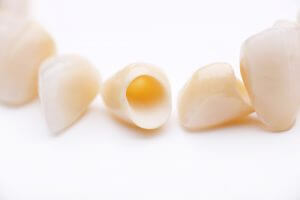
If you’ve heard the terms “tooth crown” and “tooth cap,” you might wonder how they differ. Put simply, both terms refer to the same thing, and can be used interchangeably as in this article.
“Cap” is a more casual word for “crown”, both referring to a covering placed over a shaved-down tooth. Some people might say that a “crown” is metal-coloured while a “cap” is tooth-coloured, but this is not a differentiation that dentists make.
Dental crowns are used to restore and enhance teeth that are damaged, or to take the place of missing teeth. A crown, also referred to as a cap, is used to entirely cover a damaged tooth. A crown not only strengthens a tooth, but it can drastically improve a tooth’s appearance, shape and alignment.
Temporary crowns are a good option to help with a patient’s current problem before a permanent crown can be made and secured into place. It’s important to note that temporary crowns are more sensitive to breaking, so being extra careful when brushing, flossing, and eating is important.
Dr. Ashley Niles, Niles Family Dentistry
Full crowns vs. partial crowns
Full crowns, as described above, are the most common type of dental crown.
It is possible to get a partial crown, also known as an onlay or an inlay. Rather than completely covering the remaining tooth structure, a partial crown covers just a portion of it, leaving some of the natural tooth enamel visible. A partial crown is pre-made in a lab, just like a regular crown, and then fitted to the tooth in-office.
Your dentist may recommend a partial crown if a substantial amount of healthy tooth structure remains after removing any decay.
Types of dental crowns and materials used in the UK
The most common materials used for teeth caps in the UK include:
- A dental ceramic such as porcelain or zirconia, coloured to match the surrounding teeth
- Silver-coloured metal alloys, usually made from non-precious metals (commonly used in NHS crowns)
- A combination of the above, with ceramic fused to an inner metal crown (known as porcelain-fused-to-metal or PFM crowns)
- Gold alloys are sometimes chosen for their distinctive look.
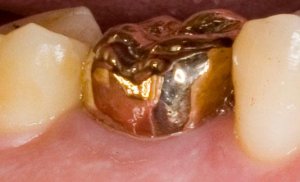
Note that gold tooth crowns are never pure gold; the metal in its pure form would be far too soft to do the job well. Instead, gold is combined with other metals to create a much stronger gold alloy. The actual gold content may be anywhere between 20%-77%.
With gold being a precious metal, gold dental crowns are more expensive than those made from non-precious metal alloys. These often contain nickel, cobalt and chromium, and are silver-coloured.
Also note that if you have a temporary crown fitted while your permanent crown is being made, this is likely to be made from acrylic or composite material.
Types of crowns with their pros and cons
Each of the materials has its own set of advantages and disadvantages. The right dental crown material for you will depend on which teeth are being capped, how you want them to look aesthetically, and how long you need them to last.
- Ceramic crowns are crafted in a lab and built up layer by layer. This gives them the same slightly translucent appearance of natural teeth and makes them a popular choice for front teeth. The cons of any ceramic material is that, although it is very strong, it is more brittle than metal. Therefore, porcelain crowns are more likely to crack or chip and may need to be replaced sooner.
- Emax crowns are a type of ceramic crown from the brand Ivoclar Vivadent. They are made from a single block of lithium disilicate, making them slightly more durable than other types of all-ceramic crowns.
- Gold dental crowns and those made from other alloy metals are much more durable. Furthermore, they are biocompatible with teeth, which means they shouldn’t damage or wear the teeth they bite against. However, many people don’t want a gold or silver-coloured tooth on show, even if it is tucked away at the back, which poses as a major drawback.
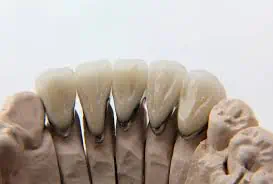
For others, having a gold tooth crown is quite appealing and they may go as far as to have it engraved or studded with gemstones!
- PFM crowns offer some of the strength of metal with the aesthetics of porcelain crowns. However, they don’t quite look like natural teeth because of the way they are layered. It’s still possible for the ceramic coating to chip or crack, but the metal underneath will remain intact.
Wondering about the NHS crown colour? For back teeth, usually, only metal crowns are offered on the NHS. It’s possible to get tooth-coloured white NHS crowns for more visible front teeth; usually PFM.
Cost of tooth crowns in the UK?
Dental crowns can cost anywhere between £300 and £800 in the UK. The exact price depends on the materials used and sometimes the position of the tooth being capped. Often, front teeth crowns cost slightly more than back teeth, since more time is taken in the lab to make them look as natural as possible.
Tooth cap prices vary greatly from one place to another. It’s worth shopping around and comparing prices between dentists near you, especially if you need to get more than one of your teeth crowned. In addition to asking your dentist about dental crown costs on the NHS vs private costs, enquire about the different material and crown type options that may be suitable for you.
To simplify things for you, we have created a comparison table for the different types of tooth crowns that you’ll find in the UK. Here, you’ll see that metal crowns are least expensive, compared to ceramic crowns which are most expensive.
Type of crown | Metal crown | Ceramic (porcelain) crown | Porcelain-fused-to-metal (PFM) crown | One-day CEREC crown |
Cost | £300 - £600 | £350 - £950 | £325 - £850 | £385 - £800 |
Strength/durability | Excellent; very long-lasting | The least durable material; liable to crack or chip | Although the metal inside is strong, the outer porcelain can chip | Can chip just like porcelain |
Aesthetics | Gold or silver-coloured so easily noticeable | Created to look just like natural teeth | Tooth-coloured but doesn't always have the translucency of natural teeth | The fast production process makes it harder to achieve a natural look |
Other comments | Won't wear down other teeth | Can gradually wear away other teeth it bites against | May gradually wear away other teeth it bites against | Can gradually wear away other teeth it bites against |
Prices may not include the cost of other treatment, for example fillings and root canals. Check full prices with your dentist. | ||||
If you need more than one, your dentist may offer a slightly lower price per crown. However, the material costs and fitting time per crown stay pretty much fixed regardless of how many you have.
How much is a crown cost on the NHS?
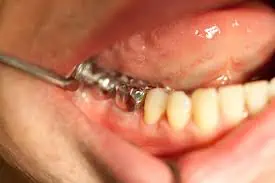
NHS dental crowns come under the Band 3 treatment charge, costing up to £282.80. This cost will apply regardless of how many crowns you’ll need to get done, as long as they are part of the same treatment course.
Our guide to NHS dental fees has all the full details that you will need.
You may be able to get a single crown for around this price privately, but if you need work on multiple teeth then the cost of crowns on the NHS offers a significant saving. The same is true if you need root canal work beforehand.
Crown colours available on the NHS
If you get an NHS crown on your back tooth, you may only be offered a silver-coloured material. You’ll usually only get a white crown on the NHS for more visible front teeth. Rather consider private treatment if you want a white crown for aesthetic reasons.
It’s highly unlikely to get all-porcelain crowns on the NHS, due to the higher price.
NHS crowns vs private crowns
A high-quality private dental crown can cost up to three times more than one on the NHS. Is it worth paying the extra money?
Let’s look at a few factors, aside from price, which differentiates NHS and private dental crowns.
- Eligibility for treatment: If you want crowns for cosmetic reasons, for example, to make uneven teeth look straighter, this will require private treatment. NHS crowns will be offered only if there is a medical need for tooth restoration.
- Natural tooth appearance: As previously mentioned, you will have a limited choice of materials for an NHS tooth crown. Even if you are offered a white front tooth crown, it will likely be porcelain-fused-to-metal. This can’t mimic the appearance of a natural tooth in the same way that all-porcelain crowns can. So, you’ll probably get a more natural look by paying for private treatment.
- Waiting times: Seeing a private dentist will speed up your treatment, both in terms of getting an initial appointment and having your crown made. Modern milling technology means you can have a crown made while you wait – no need for a temporary tooth cap. Just be prepared to pay a premium for this service!
In short, we can say that NHS dental crowns are medically sufficient to restore the function of a damaged or decayed tooth. However, it can be worth paying the extra for private treatment – especially for front teeth – if you can afford it.
How to reduce the cost of dental crowns
Private dental insurance may cover some or all of the costs you incur at various stages of the dental crown procedure.
With any insurance policy, make sure about things like waiting periods and annual limits. These annual limits may restrict when you can start claiming and how much you’ll have to pay yourself. If you need root canal treatment before getting your crown, enquire whether that is covered too.
Check out our guide to dental plans in the UK to discover more about what to consider when choosing insurance!
For cosmetic improvements, veneers may also be an option – although these are less likely to be covered by insurance. Check your policy and speak to your dentist to find out which is the best choice for you.
If you’re struggling to find the money to pay for your dental work, there are other dental financing routes you can explore.

Getting cheap dental crowns abroad
Depending on the number of teeth needing treatment, it may be more cost-effective to travel abroad for dental crowns. Dental tourism is becoming increasingly popular as Brits find themselves unable to afford complex dental care at home.
Countries like Turkey, Hungary, Poland and Spain have dental clinics which offer excellent standards of care at a fraction of the cost of UK prices. For example, dental crown costs in these countries are usually between £150 and £400, depending on the material used.
If you need several teeth crowns (or implants) then you may be able to save a considerable amount by travelling abroad, even with the cost of flights and accommodation. To find out how much your treatment will cost, you can request a free, no-obligation quote from Dentaly Go.
We look forward to being able to help you save up to 70% on the dental care you need!
We also have a full guide to dental treatment abroad which you may want to read for more information.
Dental crown procedure in the UK
Now that you know what dental crowns cost in the UK and what the different options are, let’s take a look at the tooth crown procedure step-by-step.
Visit 1: Preparation
Before any treatment can be done, your dentist has to take an x-ray to make sure your tooth is able to support a crown, and to check for any underlying complications. All being well, the dentist will numb your tooth and surrounding gums with an anaesthetic.
The dental crown procedure involves removing a significant amount – sometimes all – of the existing tooth enamel so the crown material can be securely fitted.
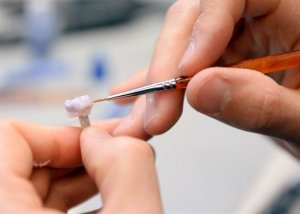
A root canal treatment may be necessary at this point. It’s also possible that your dentist will surgically remove some of the gum tissue to create a better base for the crown.
Most crowns need to be a minimum of two millimetres thick all over to allow them the strength they need to last. This means that your tooth will be trimmed by at least this much on all sides.
Your dentist will also remove all traces of decay, as well as any material from previous fillings. If this leaves very little tooth to work with, he or she may build it back up again with a filling material or a metal post.
Once this is done, the tooth stump must be slightly tapered to be thinner on the top, so the tooth cap can easily slip over it.
Next, the dentist takes an impression of what’s left of the tooth so the crown can be created to fit it perfectly. It can take 2-3 weeks for the crown to be made in the specialist lab with professional dental tools, so the dentist fits a temporary crown (made from composite or acrylic) to stop any sensitivity in the tooth.
The colour of the temporary tooth cap should blend in with your natural teeth, but the material and finish aren’t as high-quality as the permanent cap will eventually be. It’s at this point that your dentist will also choose the shade for your crown if you’re getting it made in a material to match your teeth.
This first visit usually takes between 45-60 minutes.
Visit 2: Fitting
Once the permanent crown arrives, you’ll visit your dentist again to have it fitted. The temporary tooth cap will be removed, and your dentist will again numb the tooth to avoid any sensitivity during this time.
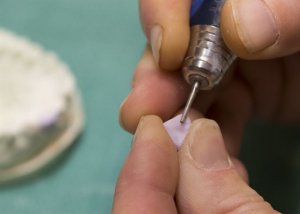
After checking that the fit of the new crown is just right, your dentist will apply dental cement on the inside of the crown and press it down over your tooth.
If you have any concerns about the colour or shape of the permanent crown (especially for a front tooth crown), be sure to speak up before it’s cemented. It’s difficult to make any changes once it is in place, and you’ll have to live with it for a long time!
The duration of this second visit depends on how many adjustments are needed before the crown can be cemented, but on average it takes 30-60 minutes.
Your newly capped teeth may feel a bit strange at first since they won’t be the same as your original ones. As long as they aren’t interfering with your bite you should get used to them within a couple of weeks.
The following video shows the full process of removing an old crown and fitting a new one. Be aware, it contains some close-ups of needles and drilling.
One-day CEREC crown fitting
There is one more type of crown that lets you avoid multiple visits and weeks or months with a temporary crown.
CEREC technology allows dentists to make crowns on-site in just an hour or so from digital scans taken of your mouth. There’s no doubt that this is a more convenient option for patients, and many are happy to forego the unpleasant dental impression process.
CEREC crowns are relatively new to the market, meaning that not much data is available on their long-term performance. However, the consensus from dentists is that while they are a strong and aesthetically pleasing option for back teeth, they can’t match the natural look of hand-crafted porcelain crowns for the very front teeth.
Private CEREC dental crowns cost about the same as regular crowns. Even though there is no lab work involved, very expensive machinery is used to speedily make the crowns. If you’re getting NHS crowns, you probably won’t have this option since they tend to cost more.
Recovery
Once you have regained normal feeling in your mouth, carefully test the bite of your crown in all directions. If anything feels odd, report it straight back to your dentist. He or she can refine the shape and ensure your crown isn’t interfering with your other teeth.
You might experience some soreness or pain in the crowned tooth or the surrounding gum following the procedure. This is quite normal, and your dentist can advise you on how to manage any tooth crown pain you experience.
It’s also not uncommon for patients to experience pain in a crowned tooth when biting down, but this should soon improve. If you have any concerns, or you experience throbbing pain after having a dental crown fitted, contact your dentist.
How long do dental crowns last?
Although crowns are a long-term solution to restore damaged teeth, they unfortunately don’t last forever. Some materials are more durable than others, but 10 years is generally the minimum lifespan expected.
You can expect your crown to last 5-15 years, but many last a great deal longer than this. A 2013 study assessed 2,340 gold-based PFM crowns and found that 97% lasted longer than 10 years while 85% were still going strong at the 25-year mark.
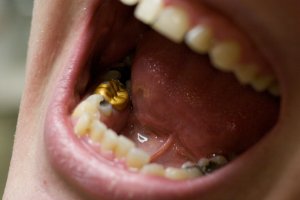
Your crown will eventually need to be replaced if:
- It becomes cracked or broken (ceramic)
- It wears down (metal) or is causing excessive wear to other teeth (ceramic)
- The tooth inside experiences decay
- Its cosmetic appearance deteriorates (in the case of a front tooth crown)
Gold tooth crowns are generally the strongest but may wear down in places if the patient suffers from bruxism (tooth grinding). This condition can also be a problem for patients with porcelain crowns as this material is more likely to wear away other teeth that bite against it.
Caring for capped teeth
Temporary crowns
While your temporary toothcap is in place you should avoid any chewy or sticky foods (like chewing gum or soft sweets) that may be able to pull it off. Hard foods, like raw carrots and apples, are also best avoided.
Try to bite and chew mainly on the side of your mouth away from the crown, or only use the crowned tooth to bite very soft foods.
Finally, when flossing, slide the floss out sideways rather than pulling it back out between the teeth. If you lift it out like normal, it could catch on the side of the crown and dislodge it.
Permanent dental caps
It is advised that you avoid hard or chewy foods for the first day after your crown is fitted. This gives the cement enough time to set properly.

In the long term, teeth with crowns should be cared for in just the same way as regular teeth; by brushing twice a day and flossing daily. If you’re worried about dental floss catching on the edge of your crown, consider investing in a water flosser instead.
The Waterpik WP-600UK Ultra (image) is one of the top-rated models in the UK. It has variable speed settings and a large water tank to make cleaning around crowns easy and convenient.
If your gums start to recede this can cause sensitivity or pain in your crowned tooth. It’s therefore important to minimise the risk of gum disease by having your teeth regularly cleaned by a hygienist.
Patients with PFM crowns may notice a dark link appearing along the gum line over time. This can be from the ceramic material eroding or from gum recession. Depending on where the crown is, you may or may not consider having it replaced at this point.
If your crown chips or comes off completely, contact your dentist immediately so they can assess the damage. Chips can be temporarily filled with composite resin but the only permanent solution is to replace the entire crown. It’s possible to re-cement a crown that has come off providing there is no damage to it.
Alternatives to dental crowns
Teeth are generally crowned when the damage is too extensive for a filling or onlay, but not bad enough to warrant extraction. If you’re concerned about conserving as much natural tooth as possible, ask your dentist about a partial crown.
On the other hand, if you have had problems with dental crowns in the past or don’t want to re-crown your tooth, consider having it removed and replaced with a dental implant.
Implants are placed into the jawbone, making them a permanent and effective tooth replacement option.
Patients who are considering crowns as a cosmetic treatment might also want to look at less invasive veneers.

Conclusion
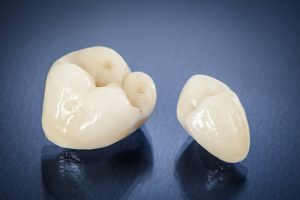
Applying a tooth crown is a good way to protect and preserve a damaged tooth for many years to come. With a little extra care in your oral hygiene routine, dental crowns should last for 10 years or more.
Private dental crowns cost £300 – £800 on average in the UK, and are also available on the NHS at £282.80.
Factors to consider when comparing private crowns vs NHS crowns not only include price, but also eligibility for treatment, waiting times and natural tooth appearance. It is important to note that NHS crowns cannot be used for any cosmetic treatments.
There are several types of crowns to choose from, all with their own pros and cons. The best type for you will be a balance between the price, aesthetics and durability. Your dentist will be able to explain your options so you can make an informed decision.
If the cost of dental crowns in the UK is beyond your budget, don’t worry! You may find it more affordable to travel abroad to countries like Turkey, Poland or Hungary. You can request a free quotation from Dentaly Go to find out how much you could save.
Get a free quote for dental crowns abroadFAQs
How much is a dental crown on the NHS?
NHS dental crowns come under the Band 3 treatment charge, costing up to £282.80. This price will apply regardless of how many crowns you need, as long as they are part of the same treatment course.
What’s the difference between a tooth crown and a tooth cap?
If you’ve heard the terms “tooth crown” and “tooth cap,” you might wonder how they differ. Put simply, both terms refer to the same thing, and can be used interchangeably. Tooth cap is just a more casual term for tooth crown.
How much does a tooth crown cost in the UK?
Dental crowns can cost anywhere between £300 and £800 in the UK. The exact price depends on the materials used and, to some extent, the position of the tooth being capped.
What crown colours are available on the NHS?
It’s highly unlikely to get all-porcelain crowns on the NHS, due to the higher price. The NHS usually only offers a silver-coloured crown for your back tooth, and a white crown for more visible front teeth. Rather consider private treatment if you want a white crown for aesthetic reasons.
National Center for Biotechnology Information: Engineering properties and performance of dental crown Consulted 24th April 2019.
British Society for Restorative Dentistry: Crowns, Fixed Bridges and Dental Implants Consulted 27th May 2020.
National Center for Biotechnology Information: The Use of Dental Crowns for Endodontically Treated Teeth: A Review of the Clinical Effectiveness, Cost-effectiveness and Guidelines Consulted 24th April 2019.





